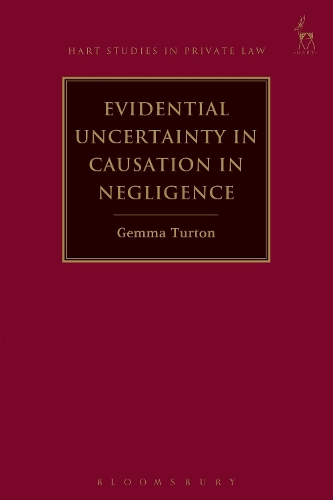
Evidential Uncertainty in Causation in Negligence
(Hardback)
Available Formats
Publishing Details
Evidential Uncertainty in Causation in Negligence
By (Author) Gemma Turton
Bloomsbury Publishing PLC
Hart Publishing
19th May 2016
United Kingdom
Classifications
Professional and Scholarly
Non Fiction
Criminal procedure: law of evidence
346.42032
Physical Properties
Hardback
264
Width 156mm, Height 234mm, Spine 12mm
540g
Description
This book undertakes an analysis of academic and judicial responses to the problem of evidential uncertainty in causation in negligence. It seeks to bring clarity to what has become a notoriously complex area by adopting a clear approach to the function of the doctrine of causation within a corrective justice-based account of negligence liability. It first explores basic causal models and issues of proof, including the role of statistical and epidemiological evidence, in order to isolate the problem of evidential uncertainty more precisely. Application of Richard Wright's NESS test to a range of English case law shows it to be more comprehensive than the 'but for' test that currently dominates, thereby reducing the need to resort to additional tests, such as the Wardlaw test of material contribution to harm, the scope and meaning of which are uncertain. The book builds on this foundation to explore the solution to a range of problems of evidential uncertainty, focusing on the Fairchild principle and the idea of risk as damage, as well as the notion of loss of a chance in medical negligence which is often seen as analogous with 'increase in risk', in an attempt to bring coherence to this area of the law.
Reviews
The authors analytical approach and clarity of thought not only enables non-English readers to gain an insight into English law but is also conductive to a better understanding of the problems of evidential uncertainty... Her thorough critical discussion of the loss of chance and material increase of the risk approaches in English law is exceedingly interesting. All parts of the book are tightly connected, the analysis is consistent and the authors message clear: there is a need of coherence in the law of negligence, best achieved through a corrective justice-based understanding, that leaves no room for the success of claims in cases of evidential uncertainty. -- Eleni Zervogianni, Aristotle University of Thessaloniki, Greece * Journal of European Tort Law *
I cannot recommend this outstanding book highly enough. Evidential Uncertainty in Causation in Negligence is a tremendous piece of scholarship that is lucidly written, thoroughly researched, and packed with stimulating insights. It can hold its own against the other excellent monographs that have recently been published on this topic, and clarifies many issues in this notoriously recalcitrant area of tort doctrine. -- Craig Purshouse, School of Law and Social Justice, University of Liverpool * Medical Law Review *
Turton's analysis is a good example of joined-up thinking, fortified by a robust account of the relevant case law and corresponding literature. It will certainly assist those wanting to access the practical relevance of NESS to English common law, and anyone struggling to consolidate the conceptual and pragmatic challenges generated by evidential uncertainty in causation in negligence. This work provides a useful tool for navigating infamously difficult legal waters. -- Sarah Green, St Hilda's College, Oxford * Professional Negligence *
Turton ... delivers on her promise to provide an account of the law of negligence that overcomes many of the difficulties presently encountered in this notoriously difficult area of law. Evidential Uncertainty in Causation in Negligence is well worth reading. -- James Plunkett, Barrister of the Inner Temple * Torts Law Journal *
Author Bio
Gemma Turton is a Lecturer in Law at the University of Leicester.
